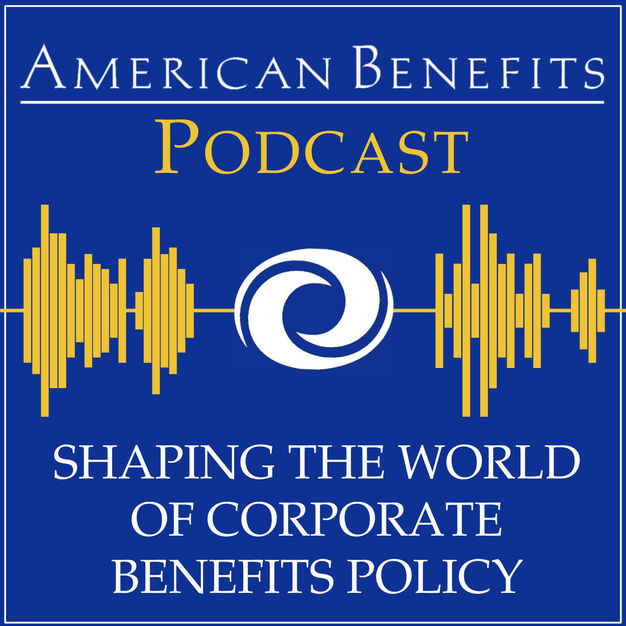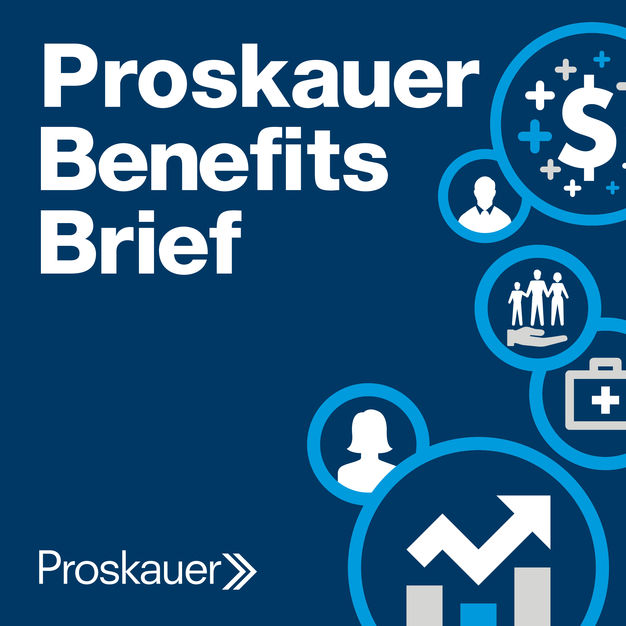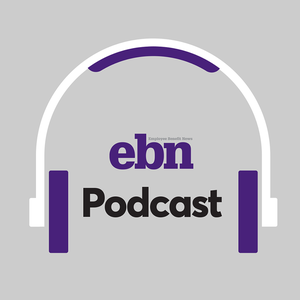
American Benefits Podcast
American Benefits Council
Tune in for thought-provoking conversations with smart, creative thinkers in the fields of benefits, economics, government, demography and more. This show is brought to you by the American Benefits Council, a Washington D.C. trade association that advocates for employers, connecting public policy and private-sector solutions to shape employee benefits for the evolving global workforce.
- 38 minutes 15 secondsCommon Sense, Common Cause: Talking Health Care Value with National Alliance CEO Shawn Gremminger
Shawn Gremminger recently assumed the role of president and CEO of the National Alliance of Healthcare Purchaser Associations -- a Council member and frequent ally on health care policy. In this episode, we discuss the National Alliance's unique structure and composition, its policy priorities and the importance of getting value for every health care dollar.
22 March 2024, 2:50 pm - 48 minutes 15 secondsWindows on Benefits: Introducing New Board Chair Fred Thiele (Microsoft Corporation)
Fred Thiele, vice president, global benefits and mobility for Microsoft, will serve as chair of the American Benefits Council's Board of Directors for the 2023-2024 term. In this episode, he speaks with host Jason Hammersla about his company's unique approach to benefits, outlines his priorities for the next year and drops a few tales of questionable reimbursement requests.
23 June 2023, 9:00 am - 39 minutes 9 secondsEpisode 45: Bigger Data: The First Step to Improving Health Equity (with Jennifer Haley, Urban Institute)
Diversity, equity and inclusion is a priority for many of the American Benefits Council’s member companies, who have in turn directed us to engage with these issues as they relate to employee benefits.
Over the previous 12 months, the Council has established a task force to address social determinants of health and joined with a number of other esteemed organizations to release the research report, Collection of Race and Ethnicity Data for Use by Health Plans to Advance Health Equity.
The project was a collaboration with Urban Institute and Deloitte’s Health Equity Institute, as funded by Elevance Health. In this podcast episode, Jennifer Haley, senior research associate in the Urban Institute's Health Policy Center, talks to host Jason Hammersla about the recent collaborative study examining the collection and sharing of race and ethnicity data and how that data might be used by health plans to advance health equity.
1 September 2022, 9:00 am - 34 minutes 52 secondsEpisode 44: Follow the Leader: Getting to Know the Council’s New Board Chair (with Tracy Watts, Mercer)
If the American Benefits Council is to be a leader in the employee benefits world, we must have strong internal leadership. The Council’s policy agenda is carefully considered and set by our Policy Board of Directors, made up of knowledgeable and dedicated human resource and benefits professionals at each of our most engaged member companies.
Holding the gavel at the head of that table is this episode's special guest. Speaking to host Jason Hammersla is Tracy Watts, senior partner in Mercer’s Washington D.C. office and the company’s National Leader for U.S. Health Care Reform. As one of the nation’s foremost experts on the intersection of health policy and business strategy, Tracy speaks with Jason about the latest in employer innovation, the importance of the Council's advocacy and her vision for the organization's future.
17 August 2022, 9:00 am - 34 minutes 5 secondsEpisode No. 43: Thinking Globally, Acting Locally: A Round-Up of the Council's International Benefits Activity
For many multinational companies, figuring out how to scale employee benefits for a global population is a critical element of their economic competitiveness. But if providing comprehensive employee benefit programs in the United States is like playing advanced chess, doing so on a global basis is like playing advanced chess on a moving speedboat.
The American Benefits Council's policy team is not only engaged with the whole wide world at the “big-picture” level, it is also focused on practical matters for global employee benefit plan sponsors like governance, employee mobility, mergers and acquisitions and more.
Guiding members and staff across those choppy waters is Lynn Dudley, our senior vice president, global retirement and compensation policy, and Mike Mullins, chair of the Council's Global Benefits Committee. In this episode, host Jason Hammersla talks to Lynn and Mike about how global benefits differ from domestic programs and what major challenges global companies face today.
3 August 2022, 9:00 am - 30 minutes 42 secondsEpisode 42: Into the Deep End: The Big Splash of Pooled Employer Plans (with Rick Jones, Aon)Even as policymakers discuss and debate the so-called "retirement savings gap," employers and others are starting to take part in a newly-minted coverage expansion tool: the SECURE Act of 2019 birthed the inception of the Pooled Employer Plan (PEP), which allows separate companies employers to team up and share plan administration for their collective employees.
On this episode of the American Benefits Podcast, host Jason Hammersla is joined by Rick Jones, senior partner in Aon’s National Retirement Practices group. Together they discuss the state of employer plan sponsorship, barriers to plan formation and how PEPs might improve the environment for plan sponsors.
20 May 2022, 9:00 am - 47 minutes 43 secondsEpisode 41: Get Out the Map: Paid Leave and the State of Play
Paid leave may not be an “employee benefit,” strictly speaking, in the same way that health coverage and retirement coverage are. But providing it has become a significant pressure point for employers, especially as an increasing number of states and localities have erected their own mandates over the last decade.
In this episode, host Jason Hammersla talks about this slow-motion explosion of paid leave mandates with one of the nation's foremost legal authorities on the subject: Josh Seidman, a partner in the Labor and Employment department of Seyfarth Shaw, LLP.
Together, Jason and Josh talk about the history of state and municipal paid leave statutes, how to think about them in their present form, and what the future holds. We also, somehow, touch on a couple of classic cinematic comedies.
View Josh's bio here: https://www.seyfarth.com/people/joshua-d-seidman.html
Council members can access the State Paid Leave Atlas here: https://www.americanbenefitscouncil.org/atlas
5 May 2022, 5:47 pm - 48 minutes 57 secondsEpisode 40: No Surprises, Please: The Twisty Tale of 'Surprise' Medical BillingThe 2020 enactment of legislation to eliminate “surprise” medical billing was not just the most significant health care coverage legislation since the Affordable Care Act. It was also the culmination of a remarkable show of (relatively) swift and bipartisan lawmaking.
Since that enactment, however, the story has taken dizzying twists and turns, with more to come as the regulatory implementation phase gives way to nationwide litigation over the Biden administration's rules.
In this episode, host Jason Hammersla speaks to Katie Keith, a member of the research faculty for the Georgetown University Center on Health Insurance Reforms, and who has been following the surprise billing saga closely as a contributor to the Health Affairs blog. Keith puts the 2020 law in context, explains how regulatory agencies have sought to implement the law and breaks down the six different lawsuits scattered throughout the country.
You can find Katie Keith's writing on Health Affairs' Following The ACA Forefront article series and the recently launched Health Reform newsletter. You can also find her recent article on the surprise billing litigation at The Commonwealth Fund.
21 April 2022, 9:00 am - 38 minutes 52 secondsEpisode 39: Plumbing and the PBGC: How Plans and Participants are Getting Stuck
Even casual observers know that, over the past several decades, the nation's retirement system has evolved from a predominantly defined benefit system to a predominantly defined contribution system. That said, there are still nearly 47,000 defined benefit plans in the United States, (half of which are insured by the Pension Benefit Guaranty Corporation, or PBGC), covering almost 33 million people and totaling more than $3.2 trillion in assets.
On this past New Year's Eve, the PBGC’s Participant and Plan Sponsor Advocate, Connie Donovan, issued the 2021 Annual Report of the Participant and Plan Sponsor Advocate, highlighting the agency’s successes and improvements, as well as areas of lingering concern. (See the report here: https://www.pbgc.gov/documents/2021-annual-report-participant-and-plan-sponsor-advocate)
In this episode, Donovan speaks with host Jason Hammersla about the customer experience with PBGC, including what she has characterized as “internal administrative issues” within the agency.
24 March 2022, 11:00 am - 46 minutes 26 secondsEpisode 38: Nontraditional Workers and Barriers to Retirement SavingsThe current labor market is in flux, with many industries still in pandemic recovery while the "great resignation" creating a talent vacuum. Contingent or "nontraditional" work may not be as trendy a topic as it was five years ago, but it could represent a resource for companies seeking to fill important roles.
In this episode, host Jason Hammersla speaks to John C. Scott, director of the Pew Charitable Trusts Retirement Savings Project, about recent research on the retirement preparedness of "nontraditional workers" and remaining barriers to their improved financial security.
10 March 2022, 11:00 am - 46 minutes 4 secondsEpisode No. 37: Still V.B.I.D.: Chronic Disease and the Drive to Health Care Value
According to a recent report by the Centers for Disease Control and Prevention, 6 in 10 adults in the U.S. have at least one chronic disease, while 4 in 10 have two or more. The CDC also estimates that 90% of the nation’s health care expenditures are for people with chronic and mental health conditions. And it’s very likely that the pandemic has exacerbated chronic disease by disrupting access to chronic disease treatment and control services.
If we have any hope of lowering health care costs and improving outcomes – which is the crux of the Council’s health policy agenda – we have to address chronic care.
On this episode of the American Benefits Podcast, the Council’s Senior Advisor, Health Policy, Katy Spangler speaks to Dr. A. Mark Fendrick, professor of Internal Medicine in the University of Michigan School of Medicine and a Professor of Health Management and Policy in the School of Public Health at the University of Michigan, and Paul Fronstin, director of the Health Research and Education Program at EBRI, about a recent study they published on employer take-up of pre-deductible chronic care services.
24 February 2022, 12:00 pm - More Episodes? Get the App
Your feedback is valuable to us. Should you encounter any bugs, glitches, lack of functionality or other problems, please email us on [email protected] or join Moon.FM Telegram Group where you can talk directly to the dev team who are happy to answer any queries.
 McGohan Brabender Side Affects: Disrupting Health Care
McGohan Brabender Side Affects: Disrupting Health Care
 Talking Benefits
Talking Benefits
 NFP Benefits Compliance Podcast
NFP Benefits Compliance Podcast
 Proskauer Benefits Brief: Legal Insight on Employee Benefits & Executive Compensation
Proskauer Benefits Brief: Legal Insight on Employee Benefits & Executive Compensation
 Employee Benefit News Podcast
Employee Benefit News Podcast
 HS 325 Audio: Group Benefits: Basic Concepts And Alternatives
HS 325 Audio: Group Benefits: Basic Concepts And Alternatives